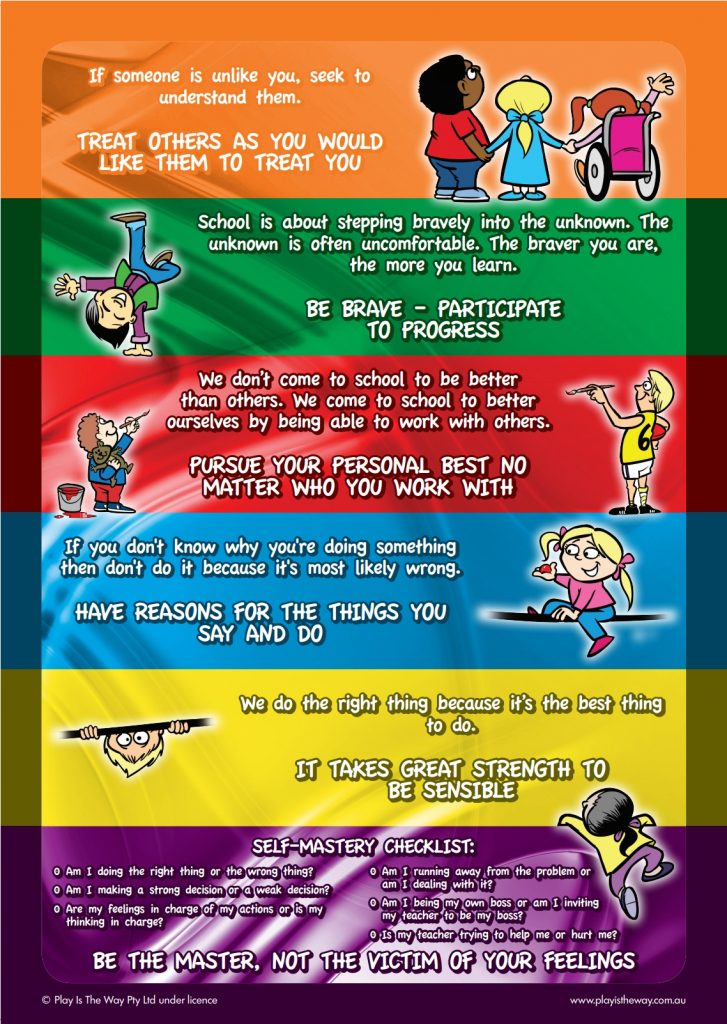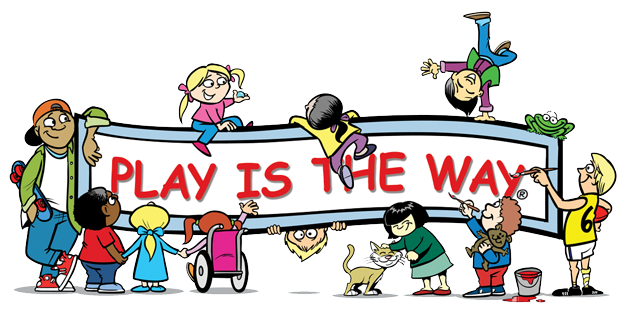As parents we are all concerned about the well-being of our own children and hopefully that of other children as well. Well-being is often thought of as happiness but it is more than that. We need to feel worthwhile, with lives that are fulfilling and meaningful.
We need the skills to create close personal connections and a network of strong relationships that give us a sense of belonging. We need the skills of emotional intelligence and social competency if we are to really feel like “WELL-BEINGS.”
Evidence proves that children with strong pro-social behaviour tend to lead more positive lives, have more meaningful relationships, enjoy better physical and mental health and do better at school.
In the light of such evidence, many schools are making a commitment to the sustained and thorough development of pro-social behaviour.
School though, is not the only place where children learn. Even with five hours a day, for five days a week, for four terms a year, children still do most of their “learning for life” outside school. In fact, most of their character shaping comes from family influences.
What they learn within the family allows them to apply it outside the family. Similarly, what they learn in school needs to be applied outside school. Hopefully, what children learn in home and school helps them to conform to the demands and expectations of community standards in behaviour and to the requirements of everyday life and learning.
PLAY IS THE WAY® is a social and emotional learning (SEL) methodology that helps schools develop empathetic, independent, self-managing, self-motivated young people of good character.
WHAT IS SOCIAL AND EMOTIONAL LEARNING (SEL)?
“Social and emotional learning (SEL) is an integral part of education and human development. SEL is the process through which all young people and adults acquire and apply the knowledge, skills, and attitudes to develop healthy identities, manage emotions and achieve personal and collective goals, feel and show empathy for others, establish and maintain supportive relationships, and make responsible and caring decisions.
SEL advances educational equity and excellence through authentic school-family-community partnerships to establish learning environments and experiences that feature trusting and collaborative relationships, rigorous and meaningful curriculum and instruction, and ongoing evaluation. SEL can help address various forms of inequity and empower young people and adults to co-create thriving schools and contribute to safe, healthy, and just communities.”
Source: casel.org CASEL: The Collaborative for Academic, Social, and Emotional Learning
HOW DOES PLAY IS THE WAY® DELIVER SEL?
We call SEL, “behaviour education” and treat behaviour as a subject. We do not expect children to do well in it if they do not receive the appropriate and necessary education.
PITW uses:
- Physically interactive, games and activities that both require and develop personal and social capabilities as they are being played.
- Five guiding concepts that serve as a moral compass and help children to do what they believe is right and best to do. When embedded, these concepts prevent children from drowning in life and learning – hence, they are aptly called Life Raft concepts. (See below)
- An empowering self-reflective language that helps children to master their behaviour in preparation for a responsible life in a free and democratic society.
- Six key virtues we call our Pathway To Empathy virtues. When understood, practised and habituated, these virtues result in people of strong character and empathy. (See below)
It is our belief that personal and social capabilities must be addressed in all learning areas and at every stage of a student’s learning. And this is only possible if students and teachers have a language, concepts and understandings that are applicable in all contexts. Play Is The Way sees social and emotional learning as a tide that floats all boats.
Play Is The Way is suitable for primary school children of all ages, abilities and ethnicities. No particular sporting or athletic ability is required to successfully participate.
Play Is The Way is not a short-term behavioural intervention. It is a methodology that accompanies children for every year of their lives within a primary school.
The Play Is The Way is cross-curriculum methodology for social and emotional learning. Typically, students participate in 3 x 20 minute games sessions per week for every available week of the school year.
WHY GAMES?
Guided by informed teachers, PITW games:
- help children to develop and habituate patterns of behaviour that are socially effective and culturally appropriate.
- teach children to respond appropriately to the thrill of success and the disappointment of failure – to enjoy competition with good grace and consideration for the other side.
- assist children to control impulsive behaviour and defer the need for immediate gratification as they strive for long term benefits and goals.
- encourage children to use their skills to advantage others in the pursuit of common objectives. They strengthen the skills of teamwork and cooperation and help children to build strong relationships.
- initiate a process of self-awareness and discovery. They create a shared body of experience that is used to build up relationships within the group and to develop the group.
- create a common awareness and language with which to discuss the processes of human action and interaction. They foster empathy, respect and an appreciation of difference.
- engage children’s emotions and call for the regulation of those emotions to achieve success. By being challenging, the games develop self-motivation and perseverance. They help children to identify the reasons for failure and build optimism and resilience.
- require effort and application. The games help children to understand the value of process in the pursuit of success.
- act as metaphors, similes and analogies for life and by playing these games children hone the skills that help them to live, learn, work and play well.
- improve the social, emotional, physical and mental health of children.
- are a brain compatible way of developing learning behaviours.
- Games can be more than amusement. They can do far more than develop physical skills and fitness. Every game, no matter how simple, is a structure by which children learn about themselves and others.
- Games are mini societies in action. Like societies, games ask children to make significant and worthwhile contributions that will be of value to all. That contribution may be to simply stick to the rules or just try hard. It may also be to make a super-human effort or relinquish one’s own needs, for the survival and success of others. In the hands of insightful teachers, games transcend the limits of amusement and become tools to assist in the development of emotionally intelligent, happy and purposeful children.
LIFE RAFT CONCEPTS
- Treat others as you want them to treat you.
- Be brave – Participate to Progress.
- Pursue your personal best no matter who you work with.
- Have reasons for the things you say and do.
- It takes great strength to be sensible.
LIFE RAFT FAMILY POSTER – CLICK TO ORDER

PATHWAY TO EMPATHY VIRTUES
- Good manners
- Friendliness
- Courage
- Persistence/Resilience
- Tolerance/Acceptance
- Compassion

